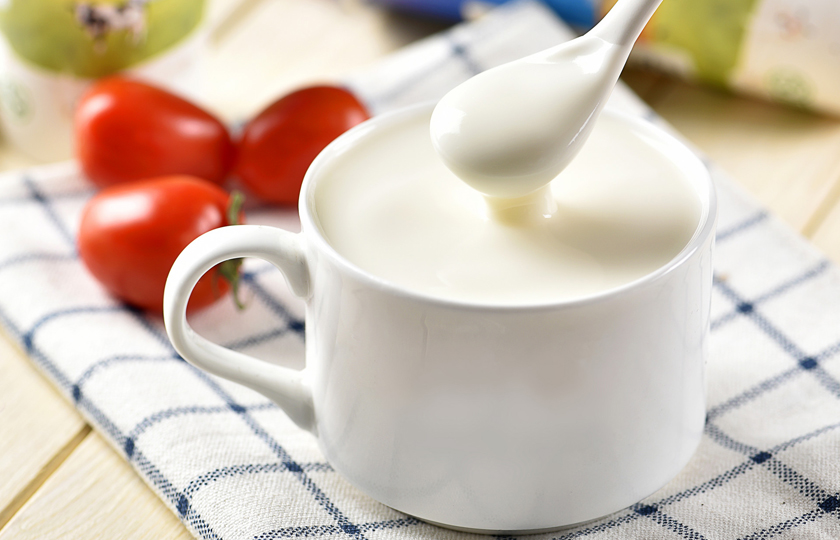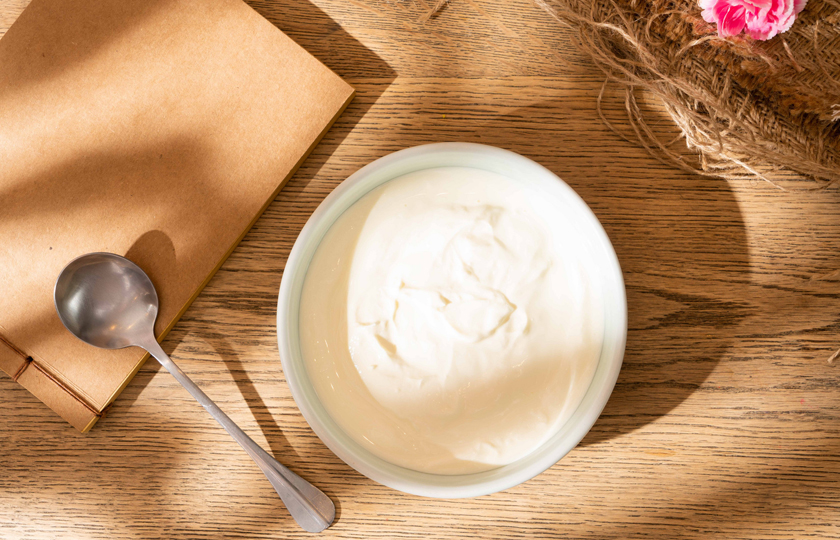Can You Use Soy Yogurt in Cooking?Here's What the Experts Say

Cooking is like a wonderful magic show, with ingredients serving as our magical elements. As we explore the endless possibilities of culinary creations, we often wonder which ingredients can spark new ideas. Soy yogurt, a unique drink that blends the flavors of soy and dairy, stands out in the beverage world and can also play unexpected roles in cooking. Could it be the secret weapon in the kitchen? Today, let's dive into this topic!
The answer
Soy yogurt is a product made by fermenting soy milk, combining the aroma of plant protein with the sweet and tangy richness of yogurt. It can be fully utilized in cooking.
Uses of Soy Yogurt in Cooking:
As a Condiment:
The sweet and tangy flavor of soy yogurt enhances the complexity of dishes, making it especially suitable for pairing with spicy or robust dishes like curries and grilled meats.
In Desserts:
Its smooth texture and unique sweet-tart flavor make it an ideal ingredient for desserts, such as yogurt mousse and fruit salads.
As a Substitute for Traditional Dairy:
For those who are lactose intolerant or pursuing a plant-based diet, soy yogurt is an excellent alternative.
Important Notes:
When using soy yogurt in cooking, it's essential to pay attention to the quantity and pairings to avoid compromising the overall flavor of the dish. Additionally, store it in a refrigerated environment to maintain freshness and the activity of beneficial probiotics.
Can you use soy yogurt as a substitute for Greek yogurt?
Soy yogurt can often replace Greek yogurt, but there are a few details to keep in mind when using it.
Reasons for Substitution:
Texture and Consistency:
Soy yogurt is typically slightly less thick than Greek yogurt, but you can choose brands of soy yogurt that are specially thickened to achieve a closer texture.
Nutritional Content:
Soy yogurt is rich in plant-based protein and fiber, making it suitable for vegetarians and those who are lactose intolerant. While Greek yogurt has a higher protein content, soy yogurt remains a healthy alternative.
Versatility:
Soy yogurt can be used in baking, as a condiment, in salad dressings, and in cold drinks, similar to Greek yogurt.
Considerations:
Acidity:
The acidity of soy yogurt may differ from that of Greek yogurt, which could affect the final flavor of certain recipes. Adjust other acidic ingredients as needed.
Heating:
Soy yogurt may separate when heated, so it’s recommended to warm it gently during cooking.
Flavor:
The taste of soy yogurt is slightly different from that of Greek yogurt, which may influence the flavor of some dishes, especially those that rely on a rich dairy flavor.
Summary:
Soy yogurt can be a substitute for Greek yogurt, particularly for vegetarians and those who are lactose intolerant. However, it’s important to consider differences in texture, acidity, and flavor to ensure the final dish meets your expectations.
Is soy yogurt the same as regular yogurt?
Soy yogurt and regular yogurt have significant differences, mainly in their ingredients, nutritional value, and suitable audiences:
Ingredients:
Soy Yogurt: Made primarily from soybeans and typically fermented with plant-based probiotics. It contains no dairy, making it suitable for those who are lactose intolerant and for vegetarians.
Regular Yogurt: Usually made from cow's or goat's milk and formed through fermentation. It contains dairy and lactose.
Nutritional Value:
Soy Yogurt: Rich in plant protein, fiber, calcium, and certain vitamins (like B vitamins). Since it contains no lactose, it's ideal for those who are lactose intolerant.
Regular Yogurt: Higher in protein, calcium, and probiotics, often providing abundant vitamin B12 and other nutrients.
Texture and Flavor:
Soy Yogurt: Generally has a milder taste, with a possible beany flavor, and is usually slightly thinner in texture compared to regular yogurt.
Regular Yogurt: Creamy with a rich flavor, typically tangy, and has a thicker consistency.
Suitable Audience:
Soy Yogurt: Ideal for vegetarians, lactose-intolerant individuals, and those looking to reduce animal product consumption.
Regular Yogurt: Suitable for most people, though those who are lactose intolerant may experience discomfort.
In summary, soy yogurt and regular yogurt differ significantly in ingredients, nutritional value, and taste. The choice between them largely depends on personal dietary preferences, health needs, and flavor preferences.
What are the uses of soy yogurt?
Soy yogurt has various applications, including:

Direct Consumption:
Breakfast or Snack: Rich in protein and fiber, soy yogurt makes an ideal choice for breakfast or a healthy snack.
With Fruits: Mixing it with fresh fruits enhances flavor and nutritional value.
Culinary Applications:
Condiment: The sweet and tangy flavor of soy yogurt elevates the taste of dishes, especially those that are spicy or rich, like curries and grilled meats.
Sauces and Dips: It can be used to make yogurt-based sauces, such as tzatziki or salad dressings, as a substitute for traditional cream-based sauces or mayonnaise.
Baking Uses:
Batters and Doughs: Soy yogurt can replace some milk or regular yogurt in recipes, adding moisture and flavor.
Desserts: It's perfect for making yogurt mousse, fruit salads, and yogurt parfaits, providing a delicate texture and unique sweet-tart taste.
Health Benefits:
Source of Plant Protein: Ideal for vegetarians and those who are lactose intolerant, offering a rich source of plant protein.
Low in Fat and Sugar: Typically lower in fat and sugar compared to traditional yogurt, making it suitable for those managing caloric intake.
Special Dietary Needs:
Lactose Intolerance: As it contains no lactose, soy yogurt is suitable for individuals who are lactose intolerant.
Vegetarians: Being a plant-based yogurt, it’s an excellent choice for vegetarians.
Other Uses:
Beauty and Skincare: Rich in vitamins and antioxidants, soy yogurt can be used in homemade masks to hydrate the skin.
Hair Care: It can be added to conditioners or shampoos to enhance shine and smoothness in hair.
What can you use as a substitute for soy yogurt?
When looking for alternatives to soy yogurt, consider the following options:
Substitute Choices:
Plant-Based Yogurts: Options like coconut yogurt and almond yogurt have similar flavors and textures, making them good substitutes.
Dairy Products: For those not seeking a plant-based diet, whole milk, low-fat milk, or Greek yogurt can provide a similar taste and nutritional profile.
Other Plant Milks: Almond milk or oat milk can also be used, though they tend to have lower protein and calcium content, so use them judiciously.
Substitute Selection Tips:
Consider Flavor and Texture: Different substitutes may vary in flavor and texture, so choose based on the specific recipe requirements.
Assess Nutritional Needs: If you need a high-protein option or specific nutrients, select substitutes that are rich in those elements.
What nutrients does soy yogurt contain?
Protein: A good source of plant-based protein, primarily from soy, which supports muscle repair and growth.
Carbohydrates: Provides energy, typically from added sweeteners or fruits.
Fat: Contains small amounts of healthy fats, mainly from soy, and is usually low in saturated fat.
Fiber: Some soy yogurts may have added fiber, which aids digestion and supports gut health.
Vitamins:
B Vitamins: Such as B2 (riboflavin), B12 (if fortified), and folate, which support energy metabolism and red blood cell production.
Vitamin D: Some soy yogurts are fortified with vitamin D to help with calcium absorption.
Minerals:
Calcium: Many soy yogurts are fortified with calcium, supporting bone health.
Magnesium, Iron, Zinc: These minerals contribute to various physiological functions.
Probiotics: If fermented, soy yogurt may contain probiotics, which promote gut health and boost the immune system.
What kind of yogurt is used for cooking?
Plain Yogurt
Characteristics: Thick texture, moderate acidity, rich dairy flavor, with minimal added spices and sugars, highlighting the yogurt's natural taste.
Culinary Uses
Salads: Used as a base for salad dressings, mixed with olive oil, vinegar, salt, etc., to add a refreshing acidity.
Baking: Ideal for cakes and muffins, keeping the finished products moist.
Marinating Meat: The acidity helps tenderize the meat.
Greek Yogurt
Characteristics: Thick texture, higher protein content, and a stronger acidity, achieved by filtering out some whey.
Culinary Uses
Sauces: Perfect for making Tzatziki (a cucumber yogurt dip), providing thickness and tanginess.
Baking: Can replace some cream or butter for healthier, lower-fat baked goods.
Soups: Enhances the thickness and flavor complexity of soups.
Low-Fat Yogurt
Characteristics: Lower fat content while retaining basic nutrients and flavor, suitable for those controlling fat intake.
Culinary Uses
Healthy Dishes: Great for low-fat salad dressings, baked goods, and light soups, offering acidity and thickness.
Unsweetened Yogurt
Characteristics: No added sugars, pure acidity, and can vary in thickness.
Culinary Uses
Low-Sugar Dishes: Ideal for those managing sugar intake, such as diabetics; can be paired with sweeteners to adjust acidity and sweetness to personal taste.























